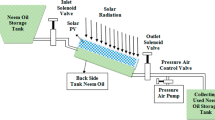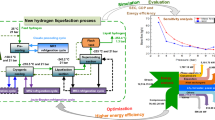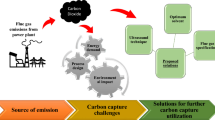Abstract
Waste heat recovery (WHR) is one of the most useful ways to improve the efficiency of internal combustion engines, and an electricity-cooling cogeneration system (ECCS) based on Rankin-absorption refrigeration combined cycle for the WHR of gaseous fuel engines is proposed in the paper. This system can avoid wasting the heat in condenser so that the efficiency of the whole WHR system improves, but the condensing temperature of Rankin cycle (RC) must increase in order to use absorption refrigeration system, which leads to the decrease of RC output power. Therefore, the relationship between the profit of absorption refrigeration system and the loss of RC in this combined system is the mainly studied content in the paper. Because the energy quality of cooling and electricity are different, cooling power in absorption refrigeration is converted to corresponding electrical power consumed by electric cooling system, which is defined as equivalent electrical power. With this method, the effects of some important operation parameters on the performance of the ECCS are researched, and the equivalent efficiency, exergy efficiency and primary energy rate are compared in the paper.
Similar content being viewed by others
References
Ringler J, Seifert M, Guyotot V, et al. Rankine cycle for waste heat recovery of IC engines. In: 2009 SAE International Conference. Detroit, 2009
Shu G Q, Liang Y C, Wei H Q, et al. A review of waste heat recovery on two-stroke IC engine aboard ships. Renew Sust Energ Rev, 2013, 19: 385–401
Cho H M, He B Q. Spark ignition natural gas engines-a review. Energ Convers Manage, 2007, 48: 608–618
Imran A S, Emberson D R, Diez A. Natural gas fueled compression ignition engine performance and emissions maps with diesel and RME pilot fuels. Appl Energ, 2014, 124: 354–365
Ho J C, Chua K J, Chou S K. Performance study of a microturbine system for cogeneration application. Renew Energ, 2004, 29: 1121–1133
Papagiannakis R G, Hountalas D T. Combustion and exhaust emission characteristics of a dual fuel compression ignition engine operated with pilot diesel fuel and natural gas. Energ Convers Manage, 2004, 45: 2971–2987
Papagiannakis R G, Kotsiopoulos P N, Zannis T C, et al. Theoretical study of the effects of engine parameters on performance and emissions of a pilot ignited natural gas diesel engine. Energy, 2010, 35: 1129–1138
Li H. Application Study on Gas Engine-Based Cooling Heating and Power System. Dissertation of Doctoral Degree. Beijing: Tsinghua University, 2006
Qi T, Zhang Z Y. The application for the waste heat recovery of gas engines in oil field. Energ Conserv, 2006, 10: 52–54
Zhao G S. The research on the waste heat recovery of generating unit in Shi Wu power station. Safty Health Environ, 2011, 12: 28–30
Daniela G. Waste heat recovery from a landfill gas-fired power plant. Renew Sust Energ Rev, 2012, 16: 1779–1789
MAN Corporation. Technology Boosts Efficiency-WHR and TCS-PTG improve efficiency on large engines. Product manual, 2011. http://www.entry.man.eu/de/de/index.html
Wärtsilä Corporation. Waste heat recovery (whr): Fuel savings with less emissions. Product manual, 2007. http://www.wartsila.com/en/Home
Shu G Q, Liu L N, Hua T, et al. Analysis of regenerative dual-loop organic Rankine cycles (DORCs) used in engine waste heat recovery. Energ Convers Manage, 2013, 76: 234–243
Liang Y C, Shu G Q, Hua T, et al. Analysis of an electricity-cooling cogeneration system based on RC-ARS combined cycle aboard ship. Energ Convers Manage, 2013, 76: 1053–1060
Liang Y C, Shu G Q, Hua T, et al. Theoretical analysis of a novel electricity-cooling cogeneration system (ECCS) based on cascade use of waste heat of marine engine. Energ Convers Manage, 2014, 85: 888–894
Takeshi K, Kiyoaki S, Hiroto N. Development of CNG fueled engine with lean burn for small size commercial van. JSAE Review, 2001, 22: 365–368
Badr O, Alsayed N, Manaf M. A parametric study on the lean misfiring and knocking limits of gas-fueled spark ignition engines, PII. Appl Therm Eng, 1998, 18: 579–594
Adewusi S A, Zubair S M. Second law based thermodynamic analysis of ammonia-water absorption systems. Energ Convers Manage, 2004, 45: 2355–2369
Mejbri K H, Bellagi A. Modelling of the thermodynamic properties of the water-ammonia mixture by three different approaches. Int J Refrig, 2006, 29: 211–218
Schulz. Equations of state for the system ammonia-water for use with computers. In: The XIIth International Congress of Refrigeration. Washington DC, 1971
Liu Q W. Performance studies on NH3-H2O absorption refrigeration HGAX cycles using low temperature exhaust heat. Dissertation of Doctoral Degree. Dalian: Dalian University of Technology, 2012
Havelsky V. Energetic efficiency of cogeneration systems for combined heat, cold and power production. Int J Refrig, 1999, 22: 479–485
Onovwiona H I, Ugursal V I. Residential cogeneration systems: Review of the current technology. Renew Sust Energ Rev, 2006, 10: 389–431
Wattana W S, Menkea C, Kamolpus D, et al. Study of operational parameters improvement of natural-gas cogeneration plant in public buildings in Thailand. Energ Build, 2011, 43: 925–934
Aguilar F J, García M T, Trujillo E C, et al. Prediction of performance, energy savings and increase in profitability of two gas turbine steam generator cogeneration plant based on experimental data. Energy, 2011, 36: 742–754
Abusoglu A, Kanoglu M. Exergetic and thermoeconomic analyses of diesel engine powered cogeneration: Part 1. Appl Therm Eng, 2009, 29: 234–241
Kanoglu M, Dincer I. Performance assessment of cogeneration plants. Energ Convers Manage, 2009, 50: 76–81
Liu M, Zhang N. Proposal and analysis of a novel ammonia water cycle for power and refrigeration cogeneration. Energy, 2007, 32: 961–970
Xie N L. Studying of evaluation method of combined cold, heat and power system. Build Energ Environ, 2008, 27: 81–83
Jannelli E. Thermodynamic performance assessment of a small size CCHP (combined cooling heating and power) system with numerical models. Energy, 2014, 65: 240–249
Pu W. Refrigeration Technology and Equipment. Shanghai: Shanghai Jiaotong University Press, 2006
Dong J X, Exploitation of design calculation software for ammonia water absorption refrigeration system. Dissertation of Masteral Degree. Shanghai: Southeast University, 2000
Siddiqi M A, Atakan B. Alkanes as fluids in Rankine cycles in comparison to water, benzene and toluene. Energy, 2012, 45: 256–63
Mario D, Mateus H. Thermoeconomic assessment of an absorption refrigeration and hydrogen-fueled diesel power generator cogeneration system. Int J Hydrogen Energ, 2014, 39: 4590–4599
Author information
Authors and Affiliations
Corresponding author
Rights and permissions
About this article
Cite this article
Shu, G., Wang, X., Tian, H. et al. Analysis of an electricity-cooling cogeneration system for waste heat recovery of gaseous fuel engines. Sci. China Technol. Sci. 58, 37–46 (2015). https://doi.org/10.1007/s11431-014-5742-7
Received:
Accepted:
Published:
Issue Date:
DOI: https://doi.org/10.1007/s11431-014-5742-7




